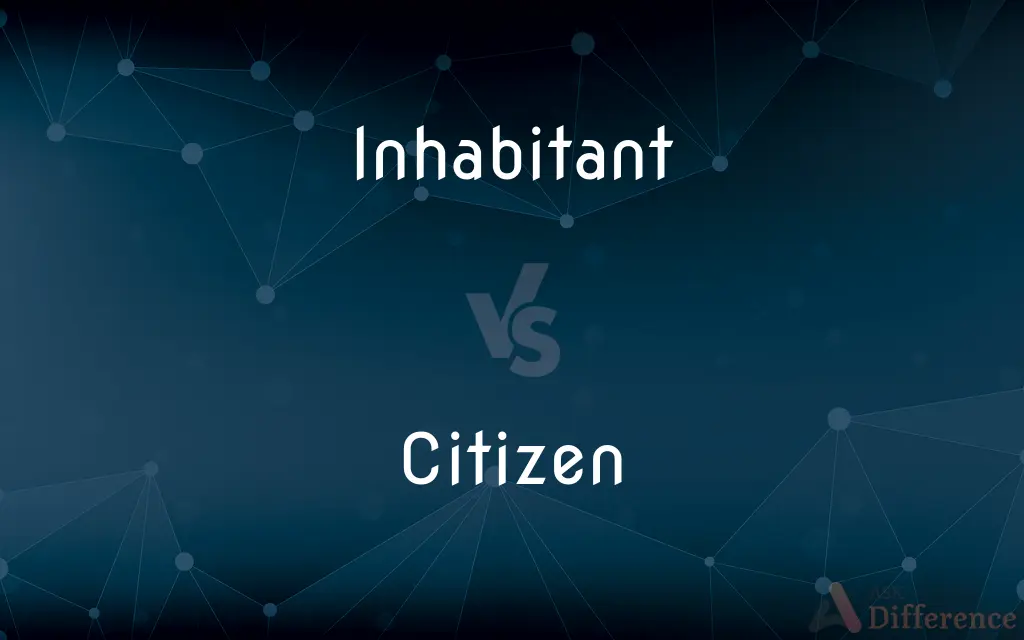Inhabitant vs. Citizen — What's the Difference?
By Tayyaba Rehman & Maham Liaqat — Updated on March 21, 2024
An inhabitant resides in a place without implying citizenship, while a citizen holds legal status and rights in a country.

Difference Between Inhabitant and Citizen
Table of Contents
ADVERTISEMENT
Key Differences
An inhabitant refers to anyone who lives in a specific place, regardless of their legal status or nationality. This term emphasizes residency over legal or formal ties. On the other hand, a citizen is someone who is legally recognized as a member of a country, with specific rights and responsibilities afforded by that status. Citizenship often requires meeting certain legal criteria, such as birth in the country, naturalization, or descent from citizens.
While inhabitants can be found in any locality, such as a city, town, or country, without necessarily having legal rights or obligations there, citizens are specifically recognized by countries and have a formal relationship with them. This distinction can affect one's ability to vote, access public services, and travel under the protection of a country's passport.
Inhabitants can be temporary or permanent residents, tourists, or migrants, showing a physical presence within a place. Citizens, however, are part of a legal framework that provides them with a permanent connection to a country, including the right to reside permanently, work, and enjoy social services.
The concept of an inhabitant focuses on the physical presence and dwelling within a specific geographical area, without implying any legal rights or obligations. Whereas, citizenship entails a legal status that comes with rights such as voting, passport entitlement, and the obligation to obey the law and possibly serve in the military or on a jury.
Inhabitants can live in a place without participating in its political processes, while citizens are often expected to engage in civic duties, including voting and jury service, highlighting a deeper social and legal integration into the fabric of a country.
ADVERTISEMENT
Comparison Chart
Definition
A person who resides in a specific place.
A person who is legally recognized by a country.
Legal status
No specific legal recognition required.
Legal recognition and rights within a country.
Rights and duties
Limited to those afforded to residents.
Includes voting, passport rights, and obligations.
Basis of association
Residency or physical presence.
Legal status, possibly by birth, descent, or naturalization.
Duration of status
Can be temporary or permanent.
Usually a permanent legal connection.
Compare with Definitions
Inhabitant
A term used to describe the presence of people in a locality.
Ancient inhabitants left behind fascinating artifacts.
Citizen
Someone holding nationality by birth or naturalization.
He became a citizen through the naturalization process.
Inhabitant
A person living in a specific area.
The inhabitants of the island are known for their hospitality.
Citizen
A person entitled to the country's protection.
Citizens traveling abroad can seek help from their embassy.
Inhabitant
Denotes a dwelling without legal implications.
As an inhabitant of the hostel, he has to follow its rules.
Citizen
Reflects a legal bond with a nation.
The new law affects all citizens equally.
Inhabitant
Someone residing temporarily or permanently in a location.
The city's inhabitants have increased due to migration.
Citizen
A legally recognized member of a country.
As a citizen, she enjoys the right to vote.
Inhabitant
Any occupant of a place.
The cave's inhabitants include various species of bats.
Citizen
Individuals with specific responsibilities towards their country.
Every citizen is expected to pay taxes.
Inhabitant
One that inhabits a place, especially as a permanent resident
The inhabitants of a fishing village.
Snakes, lizards, and other inhabitants of the desert.
Citizen
A legally recognized subject or national of a state or commonwealth, either native or naturalized
A British citizen
Inhabitant
Someone or thing who lives in a place.
Citizen
A person owing loyalty to and entitled by birth or naturalization to the protection of a state or nation.
Inhabitant
Resident
Citizen
A resident of a city or town, especially one entitled to vote and enjoy other privileges there.
Inhabitant
One who dwells or resides permanently in a place, as distinguished from a transient lodger or visitor; as, an inhabitant of a house, a town, a city, county, or state.
In this place, they report that they saw inhabitants which were very fair and fat people.
Citizen
A civilian.
Inhabitant
One who has a legal settlement in a town, city, or parish; a permanent resident.
Citizen
A native, inhabitant, or denizen of a particular place
Citizens of rural Utah.
Inhabitant
A person who inhabits a particular place
Citizen
A resident of a city or town, especially one with legally-recognized rights or duties.
Citizen
A legally-recognized member of a state, with associated rights and obligations; a person considered in terms of this role.
I am a Roman citizen.
Citizen
An inhabitant or occupant: a member of any place.
Diogenes reckoned himself a citizen of the world.
Citizen
(Christianity) A resident of the heavenly city or later of the kingdom of God: a Christian; a good Christian.
Citizen
A civilian, as opposed to a police officer, soldier, or member of some other specialized (usually state) group.
Citizen
(obsolete) An ordinary person, as opposed to nobles and landed gentry on one side and peasants, craftsmen, and laborers on the other.
Citizen
A term of address among French citizens during the French Revolution or towards its supporters elsewhere; dated a term of address among socialists and communists.
Citizen
(computing) An object.
Citizen
One who enjoys the freedom and privileges of a city; a freeman of a city, as distinguished from a foreigner, or one not entitled to its franchises.
That large body of the working men who were not counted as citizens and had not so much as a vote to serve as an anodyne to their stomachs.
Citizen
An inhabitant of a city; a townsman.
Citizen
One who is domiciled in a country, and who is a citizen, though neither native nor naturalized, in such a sense that he takes his legal status from such country.
Citizen
Having the condition or qualities of a citizen, or of citizens; as, a citizen soldiery.
Citizen
Of or pertaining to the inhabitants of a city; characteristic of citizens; effeminate; luxurious.
I am not well,But not so citizen a wanton asTo seem to die ere sick.
Citizen
A native or naturalized member of a state or other political community
Common Curiosities
Who can be considered an inhabitant?
Anyone living in a specific place, regardless of their citizenship status.
Can an inhabitant be a citizen?
Yes, a citizen can also be an inhabitant if they reside in the country of their citizenship.
Do inhabitants have the right to vote?
No, only citizens typically have the right to vote in elections.
Do citizens have more rights than inhabitants?
Generally, yes, citizens have more legal rights and obligations than mere inhabitants.
How does one become an inhabitant?
By living or residing in a place, regardless of the duration.
Is citizenship always permanent?
While citizenship is often permanent, it can be revoked or renounced under certain conditions.
Are children of citizens automatically citizens?
In many countries, yes, children born to citizens are automatically citizens, though laws vary.
Can a person change their citizenship?
Yes, through processes like naturalization, a person can change their citizenship.
Are tourists considered inhabitants?
Yes, tourists can be considered temporary inhabitants of the places they visit.
Do all inhabitants pay taxes?
Not all, but many inhabitants may pay taxes, depending on local laws and their residency status.
What defines a citizen?
A person legally recognized by a country, with certain rights and obligations.
Can inhabitants be deported?
Yes, if they are not citizens, inhabitants can be deported under certain legal circumstances.
What responsibilities do citizens have?
Responsibilities include obeying laws, paying taxes, and possibly serving in the military or on juries.
Can an inhabitant become a citizen?
Yes, through legal processes like naturalization, an inhabitant can become a citizen.
Does citizenship affect employment opportunities?
Yes, citizenship often grants access to certain jobs and employment rights that non-citizens may not have.
Share Your Discovery

Previous Comparison
Meme vs. Theme
Next Comparison
Nationalism vs. FascismAuthor Spotlight
Written by
Tayyaba RehmanTayyaba Rehman is a distinguished writer, currently serving as a primary contributor to askdifference.com. As a researcher in semantics and etymology, Tayyaba's passion for the complexity of languages and their distinctions has found a perfect home on the platform. Tayyaba delves into the intricacies of language, distinguishing between commonly confused words and phrases, thereby providing clarity for readers worldwide.
Co-written by
Maham Liaqat














































